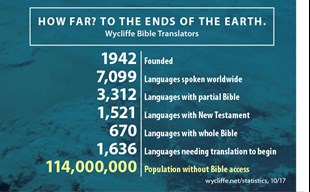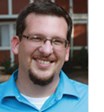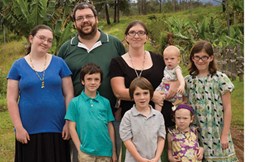By Nathan Harper*
December 2018 – Almost a quarter of the world’s languages do not have a single written verse of Scripture. Not a word. No Bible access.
 Before discovering this truth, David and Melissa Smith believed – as do most Christians, especially in the U.S., seem to assume – that the majority of people around the world have access to the Bible.
Before discovering this truth, David and Melissa Smith believed – as do most Christians, especially in the U.S., seem to assume – that the majority of people around the world have access to the Bible.
Stirred by this newly discovered reality, the Smiths and their six children took radical action.
They moved from their Mississippi home to live in the eastern highlands of Papua New Guinea, where hundreds of people groups still wait for God’s Word to be translated for them. David and Melissa serve with Wycliffe Bible Translators, bringing God’s Word to the people of PNG in their native languages.
Before moving to PNG, David worked with AFA in information services and web development. Now, he uses his technical skills with Wycliffe Bible Translators, creating applications that aid language specialists in teaching literacy. Melissa’s primary role is as a wife and mom, but she also recruits teachers for the international school in their town.
A dream come true
David had been praying about serving with WBT since college. Eighteen years ago, while attending a missions class, God began to stir his heart about both Bible translation and PNG. Not long after that, David met Melissa.
Speaking with AFA Journal, Melissa recalled, “Early on, David shared that he felt led to serve with Wycliffe in PNG. If I wasn’t on board with that, then this relationship probably wouldn’t work, and I should move along. So I prayed about that and felt a lot of confirmation about our relationship.”
David and Melissa have been married for 15 years. God has blessed them with six children: Makaylah, Sophia, Isaiah, Nehemiah, Talia, and Elora. Bible translation and the needs in PNG piqued David’s interest early, and those desires stuck with him. As the Lord blessed the Smiths with a growing family here at home, the door to serve in PNG seemed to be closing.
“But I continually felt the burden to go,” said David.
“I was okay with serving overseas, if that was what we were supposed to do,” added Melissa. “David had grown miserable about not being able to go, so I suggested we pray and ask God to either release us from this burden or open the door for us to go.”
God would honor their prayers of faith. “At that point,” Melissa continued, “God hit me with the fact that there were so many people around the world who have nothing in terms of Bible access.”
In 2014, the Smith clan had raised the support level WBT requires, and they soon moved to Ukarumpa, Papua New Guinea. Some might question the idea of taking a large family of young children to a remote, out-of-the-way location.
Melissa had people question her: “Aren’t you worried living overseas? I could never take my kids; I’d be too scared.” She confessed that she also wrestled through some of those same questions.
“God reminded me that our kids belong to Him, and He is in charge of the number of their days, whether in America or overseas. There are challenges to the life we live, but we have been blessed.” Smiling, she added, “Our kids love our life in PNG!”
A daunting challenge
“There’s a lot of work that goes into translation – being accurate, clear, and faithful to the Word of God,” said David. “It’s also important to note that there are stages of completeness. First, there is work on a number of Bible books, then the New Testament will be next. And finally, the rest of the Old Testament.”
“PNG is the most culturally and linguistically diverse country in the world,” Melissa said. “In a country the size of the state of California, there are over 800 different languages. That’s because it’s also a geographically diverse country. You have huge mountains, big rivers, and swamps. Travel is difficult. So you have all of these people groups that are very isolated from one another.”
Because of the geography, the distinct people groups are relatively near to one another in walking distance, yet extremely far from one another in terms of culture and language. One group’s language may be completely different from another group, though they live only a two-hour walk apart.
A daily commute
For translation teams, a simple commute to work can be a challenge. Common modes of travel are flying from one island to another, or riding for hours in the back of a truck as it struggles up the mountainside or cuts a new trail through the rainforest.
“Everyday life is a lot harder,” David said, an understatement no doubt.
For Melissa, her almost daily walk up and down the hill from home to the local market, buying and carrying fresh produce and simple necessities can be a challenge as well. She’s broken a foot and sprained an ankle in four years on this familiar trek.
Meal preparation and laundry are all-day chores, complete with washing the fruit and vegetables in “bleach water,” as Melissa calls it. David and the kids build a fire on chilly mornings before walking to work and school.
PNG is a microcosm of the rest of the world. There are countries all around the globe with isolated people groups who are still Bible-less. These people groups can even be found within the U.S., which has over 100 groups without access to Scripture in their heart (native) language.
WBT has a stated goal “to see a Bible translation program in progress in every language still needing one by 2025.” This is surely a challenge. Yet, if it can be accomplished in a remote nation like PNG, then how far can it go?
How far? In PNG, the question is immediately measured in hours spent walking. When considering the task of Bible translation, “How far?” must first be answered in hours spent praying.
WBT founder Cameron Townsend is well remembered for this challenging quote: “We will only advance in our evangelistic work as fast and as far as we advance on our knees.”
Indeed, the church must advance on her knees, then rise to her feet to finish the work that the Lord Jesus has given her: Carry the Word to the world. 
 * Nathan Harper served as a missionary in an Atlanta, Georgia, suburb where Global Frontier Missions serves immigrants from more than 100 people groups who speak more than 60 distinct languages. With his father, Bert Harper, he also co-hosts Exploring Missions, heard on AFR Saturdays (6:30-7:00 p.m.) and Sundays (1:00-1:30 p.m.).
* Nathan Harper served as a missionary in an Atlanta, Georgia, suburb where Global Frontier Missions serves immigrants from more than 100 people groups who speak more than 60 distinct languages. With his father, Bert Harper, he also co-hosts Exploring Missions, heard on AFR Saturdays (6:30-7:00 p.m.) and Sundays (1:00-1:30 p.m.).
 Photo left, the David Smith family
Photo left, the David Smith family
Next Steps
▶ Pray for the Smiths and others translating the Word.
▶ Contact the Smiths at facebook.com/smithsonamission.
▶ To learn more about WBT or support the Smiths, visit wycliffe.org/partner/smithsonamission.